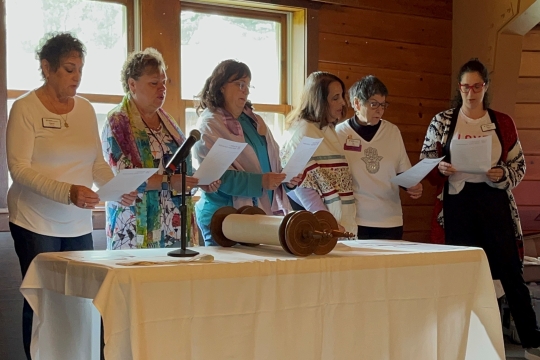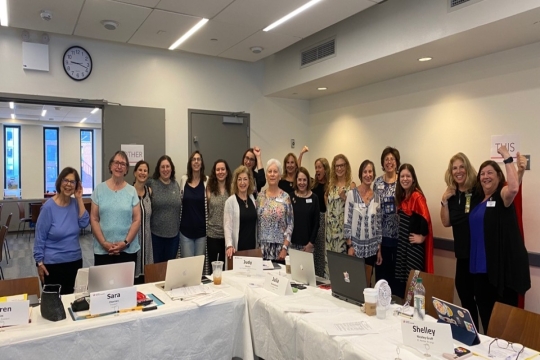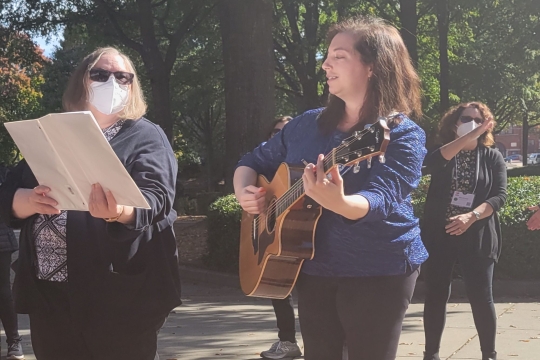
I need to share something with you. Ready? Lech Lecha is MY FAVORITE TORAH PORTION!!!
Okay, I admitted it, said it aloud, and shared it with all my WRJ sisters.
How did I come to that conclusion; you ask? 1. Lech Lecha was my Bat Mitzvah portion in 1961. I was the first Bat Mitzvah at my Temple which was founded in 1856. I was obviously a feminist before I knew that word existed. More about that another time! 2. Turn back to 1993 in San Francisco, I chaired the National Federation of Temple Sisterhoods (NFTS) Assembly when we changed our name to WRJ. My college-aged daughter Lysa, who was a local sisterhood member in good standing, rose to the mic and explained why our current name, NFTS, no longer resonated with young people – imagine being 18 years old and having the chutzpah to say that in front of all those intimidating women on the dais! Everyone listened and applauded! Total aside: she became a lawyer. By the way, it was also at that Assembly that we were challenged by Cantor Sara Sager to create a Torah commentary for and by women. Guess what Torah portion we celebrated that Shabbat ….Lech Lecha! Sara finished her compelling presentation by singing Debbie Friedman’s z’l Lechi Lach. There wasn’t a dry eye in the crowd, and we women knew we had to undertake this project that would change the face of Torah study. And 3. WRJ Past President and mentor Judy Rosenkranz definitively decided that Lechi Lach is my song. Judy and I joyfully agreed upon that claim and always share a secret smile when Lech Lecha is the weekly portion, and the music is sung.
And so, it is that the 3rd portion of the annual cycle of Torah readings Lech Lecha and its accompanying song Lechi Lach belong to me. I am, however, willing to share it with all who might also claim it. But ultimately, I know, deep inside, that I am its primary keeper! A bit of storytelling to remind you of its content– God instructs Abram to leave his birthplace; a famine forces Abraham and Sarah to Egypt; Sarah pretends to be his sister, there is a name change; they enlarge their family as the maidservant Hagar gives birth to Ishmael; Abraham gives Lot a portion of their fields and herds when Lot separates; and finally, God and Abraham establish the Covenant via circumcision.
Indulge me with a bit of Rent humming starting now: okay- are you humming?? 6336 Hebrew letters…1686 Hebrew words…126 verses…208 lines…and always on the 3rd Shabbat after Simchat Torah. You can stop humming. Those are the statistics belonging to Lech Lecha. I hope by now you considering what portion you might claim for yourself? Have you developed a relationship with a Torah portion, a Haftorah portion, a psalm, or perhaps a single story from our amazing legacy? News flash: Now is the time to find and claim yours!
What is it about Torah that has allowed it to endure after thousands of years? Perhaps, this is the true miracle of the Jewish people. This extraordinary storytelling legacy, by mouth and written word, has kept our people alive and vital. It doesn’t matter where we have been exiled to, what has terrorized our people, or how we have been bullied. Torah has survived and kept us alive.
How incredible that centuries-old Torah tales and dictums are read year after year and bring meaning, often new meaning, to our lives. Think about this: the brilliant minds behind science and technology have made our lives incredibly easier and faster. At the same time for all these years, Torah has kept us on the same ethical road that guided our matriarchs and patriarchs.
Over the past months, I have spent time contemplating what matters to me. I would imagine many of you have done the same. Much of the ‘busyness’ of life shut down. Life may have quieted a bit. Time at home became a commodity to use thoughtfully: how many hours can you spend binge-watching TV or reading or playing computer games or zooming meetings! How have you spent Covid time? Do you know? Did you ponder something important to you? Did it just pass by?
Covid taught me to cherish hugs, smiles, and hellos. It taught me to appreciate those who perform tasks I cannot take on like the mailman, hospital workers, firemen, and such. It made me more aware of those less fortunate who lost jobs or became food insecure. I could go on and on. It also taught me to value, even more, my heritage and community.
In 5781, my prayer is for our world to find our way through the darkness of 2020 – health, race relations, anger, anti-Semitism, politics, and more - to find a path to live in contentment and peace, equity and justice. Lech Lecha…may we all go forth together to make our world a better place for all peoples.
PS. Don’t forget to find YOUR favorite portion!
Related Posts

Parashat Yom Rishon shel Rosh HaShanah

Cultivating a Culture of Accountability and Belonging

